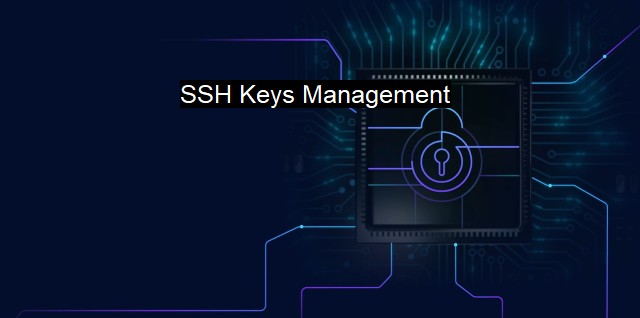What is SSH Keys Management?
Managing SSH Keys for Stronger Cybersecurity: Importance and Best Practices
SSH (Secure Shell) keys management is a crucially important component in the overarching landscape of cybersecurity and antivirus protection. The premise of SSH is that it provides a method for secure remote login from one computer to another. It provides strong password authentication and encrypted communication over unsecured networks.SSH Keys are cryptographic keys used for authentication that provide enhanced security than using just a typical password. There are primarily two types of SSH keys: the public key that can be shared with others, and the private key that is kept confidential and is accessible only to its owner. An important reason for using SSH keys instead of standard passwords is that they can’t be easily guessed or cracked using brute force attacks, thanks to their complex mathematical structuring.
Properly managing SSH keys is not simply important, but rather, indispensable in maintaining robust cybersecurity. The uncontrolled distribution and inadequate tracking of these keys can lead to unauthorized access, consequentially causing data breaches. Specifically, if a cybercriminal gets a hold of an authentic SSH key, they can access your system exactly like an authorized user, making detection tremendously difficult.
SSH keys management is, therefore, an elaborate process that involves several elements including generating, using, storing, archiving and changing keys as needed. It follows certain best practices to ensure that the SSH keys don’t fall into wrong hands, or end up being misused. Segregation of keys based on their roles and levels of sensitivity is one important such practice, adopting which can help businesses in keeping track of their numerous keys.
Key management also surrounds discarding the old or deprecated keys, and replacing them with new ones, this can be thought of as equivalent to changing passwords periodically. Since SSH keys don't expire naturally like certificates, it becomes utterly incumbent to bring to table such mechanisms to replace stale keys, in order to stay clear of compromises or breaches.
Also, cue to the fact that if a server were to be compromised, each and every one of the keys stored on that server would be susceptible to theft. The keys, in that case, must be immediately replaced so as to avoid a domino-effect of systems being compromised. This necessitates having contingencies in place to quickly replace thousand sets of keys in the event of an adverse scenario.
Many organizations have invested in SSH key management tools to help automate and simplify these elaborate processes. System administrators might find managing keys for hundreds of servers immensely challenging, increasing likelihood of errors and oversights. Secure automated tools readily come to their aid. These tools can automatically rotate keys, remove unneeded keys from servers, and perform routine key inventories which help the IT teams in maintaining system integrity and ensuring regulatory compliance.
It is important to highlight the relationship between SSH keys and antivirus programs. If SSH keys are not carefully managed, it could potentially result in a scenario where malware is introduced into a system. In such a circumstance, antivirus programs play a crucial role in identifying and eliminating the threat. Yet, they won't be as effective against an intruder who possesses a legitimate SSH key. Thus, SSH key management, on one hand, hinders the entry of cyber-attackers, and an antivirus, on the other hand, can act as a second line of defense.
The smooth management of SSH keys is an essential aspect of business cybersecurity landscapes. Given their ability to facilitate encrypted communication over insecure networks, SSH keys if suboptimely managed, may pave a way for potential threats. Hence, companies should invest extensively in SSH key management practices, tools and technologies to ensure the security of their critical data from both insider and external threats. After all, data integrity and system security are at the core of every successful digitized business today.

SSH Keys Management FAQs
What is SSH key management?
SSH key management is the process of creating, storing, and using secure cryptographic keys for secure communication between computers using the Secure Shell (SSH) protocol. It involves generating public and private keys, protecting them with proper security measures, and using them to authenticate remote connections.Why is SSH key management important in cybersecurity?
SSH key management is crucial in cybersecurity because SSH keys authenticate remote connections and secure communication between computers. Proper SSH key management can prevent unauthorized access, data breaches, and other cyber threats that can compromise system security.What are some best practices for SSH key management?
Some best practices for SSH key management include generating keys with strong encryption, storing them securely, regularly rotating keys, limiting key access, and monitoring key usage. These practices can help prevent unauthorized access and reduce the risk of cyber attacks.How can antivirus software help with SSH key management?
Antivirus software can help with SSH key management by detecting and preventing malware that can compromise SSH keys and other sensitive information. Additionally, antivirus software can provide alerts and reports on suspicious activity related to SSH key usage, helping organizations to identify potential security risks and take appropriate action.| | A | | | B | | | C | | | D | | | E | | | F | | | G | | | H | | | I | | | J | | | K | | | L | | | M | |
| | N | | | O | | | P | | | Q | | | R | | | S | | | T | | | U | | | V | | | W | | | X | | | Y | | | Z | |
| | 1 | | | 2 | | | 3 | | | 4 | | | 7 | | | 8 | | |||||||